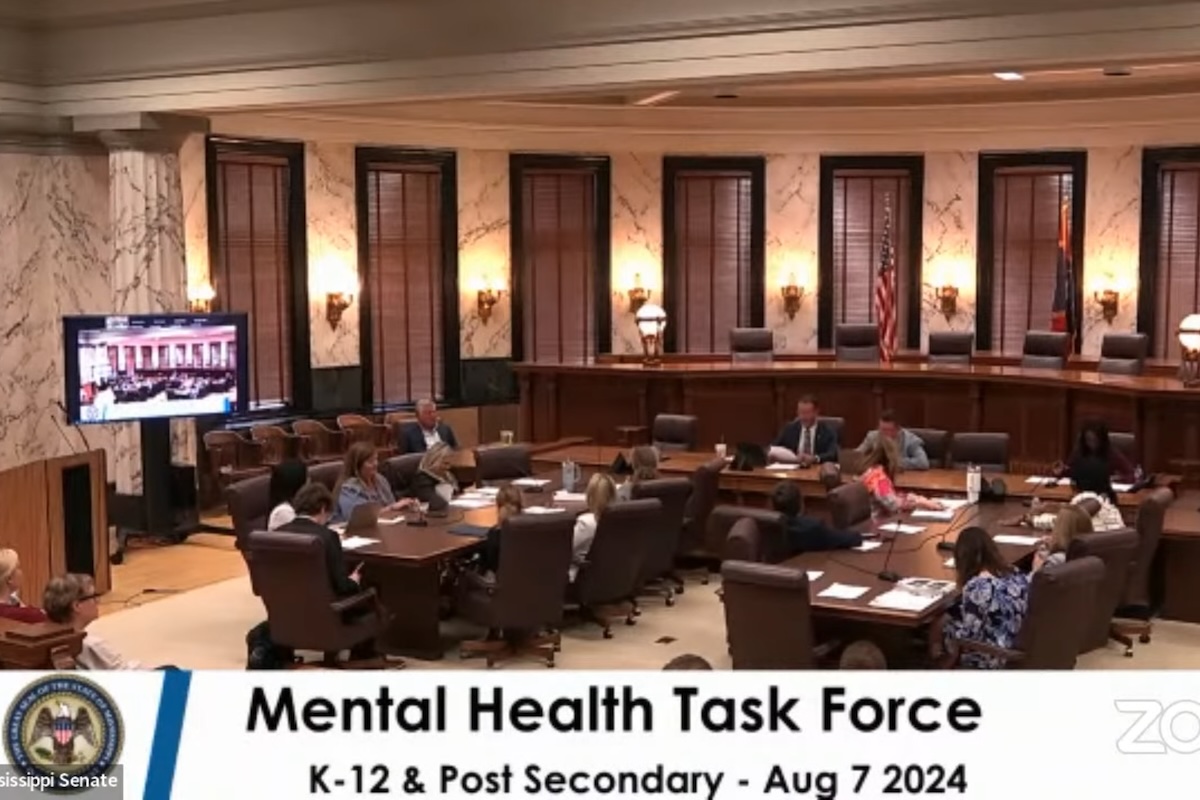The Mississippi K-12 Mental Health Task Force will meet on Wednesday, September 18, from 2 p.m. to 5 p.m. in room 216 of the Mississippi State Capitol. Here is the agenda for the meeting. All Mississippi K-12 Mental Health Task Force meetings are open to the public. If you cannot attend in person, you can watch the livestream of the meeting on the Senate YouTube channel.
The task force will discuss these suggested areas of improvement for K-12 and postsecondary (college) mental health services. The task force has based this list on feedback from presenters and task force members. Families as Allies supports many of the recommendations, and we look forward to discussing these:
- 2. Strengthen collaboration among existing mental health agencies/organizations/services/resources across the state;
- 6. Educate leadership on the role of a professional school counselor and school psychologist that contribute to full utilization of their professions;
- 7. Mandate professional school counselors for K-12 students;
- 8. Lower the student to school counselor ratio in the state;
- 19. Strengthen MDE’s Multi-Tiered System of Supports (MTSS) which utilizes evidence-based practices to support academic and behavioral needs by integrating mental health providers into all facets of the already existing Tier System;
- 26. Explore developing a cohesive system of care with a single point of entry, screening, triaging, and navigation for students and their families;
- 27. create directives/statutes to require state level leadership to work together by bringing their authority, delegated by the legislature; respectively, to collaborate on mental health resources and to access federal resources;
- 28. Reevaluate H.B. 1529 (regular session 2010) which is no longer active but in part established the Interagency Coordinating Council for Children and Youth (ICCY) to serve in an advisory capacity and to provide state level leadership and oversight to the development of the Mississippi Statewide System of Care;
Recommendation #19 encompasses many other recommendations (e.g., social-emotional learning curriculum, mental health awareness, universal screening). School districts must have the time, personnel and support to implement MTSS for behavior how they are supposed to. Community mental health providers must coordinate their work with MTSS, and memoranda of understanding (MOUs) should spell out how this coordination will happen in each district. This approach addresses many of the school issues families tell us about every day, and it is consistent with what at least some other states do.
We also support recommendations 2, 26, 27 and 28 about a coordinated system of care. Mississippi state law already mandates and outlines a coordinated system of care with a single point of entry for children with the greatest needs. That law describes how state leaders and other stakeholders (including families and youth) coordinate through the Interagency Coordinating Council for Children and Youth (ICCCY) to oversee that system and ensure all state systems work together.
Even though the ICCCY is required by state law, it does not currently function. Families as Allies has tried, without success, to find funding to implement the ICCCY. We believe legislators could strengthen state law—and the system of care—by providing infrastructure and funding for the ICCCY. State law should also hold state systems accountable for reporting outcomes and developing policies in keeping with state and federal law. We also do not recommend that the ICCCY be under the authority of any state system that oversees mental health service delivery because it creates an inherent conflict of interest.
We look forward to learning from the other task force members and sharing our perspective in Wednesday’s discussion.
We encourage anyone interested in student mental health, especially students and their families, to attend the Wednesday task force meeting in person or virtually. We also urge you to share your recommendations with the task force by emailing them to MHTF@peer.ms.gov.
These are members of the task force if you would like to share feedback with any of them:
- Dr. Jonathan Baker, UMMC Child & Adolescent Psychiatrist
- Senator Kevin Blackwell, Chairman of Senate Medicaid
- Senator Nicole Boyd, Chairwoman of Senate Universities & Colleges
- Senator Hob Bryan, Chairman of Senate Public Health & Welfare
- Wendy Clemons, Associate Superintendent at the Mississippi Department of Education
- Representative Sam Creekmore, Chairman of House Public Health & Human Services
- John Damon, CEO of Canopy Children’s Solutions
- Dr. Daniel Edney, State Health Officer
- Heather Garrett, Teacher and Science Chair at Brandon Middle School
- Dr. Joy Hogge, Executive Director for Families as Allies
- Dr. Emily Johnson, Clinical Psychologist
- Sarah Jones, Counselor at Jones College
- Melody Madaris, Executive Director at Communicare Mental Health Center
- Representative Missy McGee, Chairwoman of House Medicaid
- Heidi Nelson, USM Director of Student Counseling
- Representative Donnie Scoggin, Chairman of House Universities & Colleges
- Kate McMillin, Director of the Office of Mental Health for the Division of Medicaid
- Lynda Stewart, Director of the Division of Children and Youth Services for the Department of Human Services
- Julie Thornton, Head Nurse of the Pearl Public School District
- Jonathan Tritley, School Psychologist at the Jackson County School District
- John Robert Walker, Student Member of the Mississippi Youth Council
- Karla Weir, Assistant Professor in the Mississippi State University Counselor Education Department
Representative Rob Roberson and Senator David Parker co-chair the task force. Again, we at Families as Allies thank them for their leadership. We also appreciate the Joint Legislative Committee on Performance Evaluation and Expenditure Review (PEER) staff for their research and administrative support to the task force.

